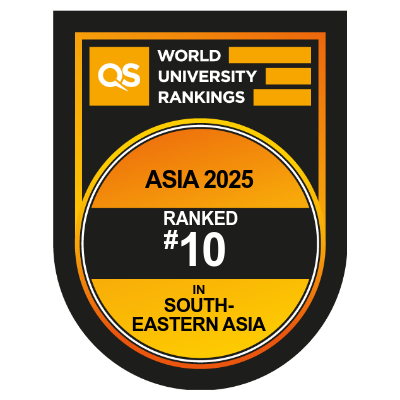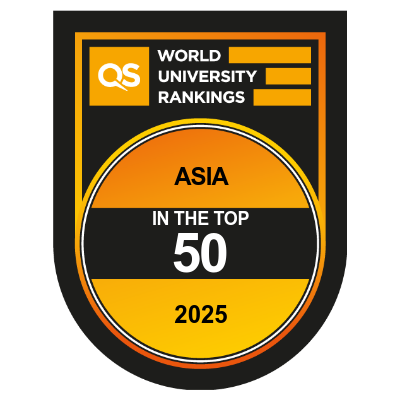sustainable development goal 4
QUALITY EDUCATION
Education elevates living standards and is fundamental for quality human resources. Ensuring equal access across economic groups is vital. Root-level education fosters solutions and produces innovative successors for modern challenges.

LIFELONG LEARNING MEASURES
Lifelong learning measures are fundamental to SDG 4, advocating for inclusive and equitable quality education. These initiatives ensure continuous skill acquisition and personal development for all ages, adapting to changing labor markets and fostering a culture of persistent learning, critical for sustainable societal progress and individual empowerment.
Universitas Indonesia (UI) is committed to providing all society levels with access to education. With strong determination, UI realizes that education is a human right that should be available for all people. To make it come true, UI provides a variety of public resources supporting lifelong learning, such as computers, libraries, online courses, and access to lectures. In addition, UI also presents several online learning materials, such as video lectures accessible through our platform.
One of the concrete measures UI has taken is providing computer facilities usable for students and the general community. Equipped with 325 computers in the library, an online library catalog (OPAC), and staff ready to assist, UI attempts to provide an easy and convenient access to discover and utilize educational resources. Internet hotspots are also available, allowing anyone to connect quickly.
UI has also developed a variety of online courses (MOOCs) available for everyone, including “Cost Accounting”, “Financial Mathematics,” and “Computer Networks” as one of UI efforts to ensure accessible knowledge and learning without barriers.
- MOOCs: Cost Accounting
- MOOCs: Financial Mathematics
- MOOCs: Computer Networks
- MOOCs: Gifted Child Educational Psychology
- MOOCs: Learning from Video Games
- MOOCs: Psychology Philosophy and History
- MOOCs: Advanced Child Clinical Psychopathology
- Research Talk with Dr.Eng. Laksmita Rahadianti
- Scientific Writing Workshop: Publishing Undergraduate Final Assignments in International Journals
UI library center is a valuable asset promoting lifelong learning. Here, visitors can find diverse facilities, such as computer rooms, reading rooms, and even multimedia classrooms. Additionally, a rich collection of textbooks and ancient manuscripts is available for study. Moreover, UI holds various events and seminars as well, in which the community can participate, such as Information Literacy Training and Webinar Series, providing recordings accessible online from anywhere.
- Service and Management Guidelines by the Directorate of Operations and Facilities Maintenance of UI
- Facilities Provided by the Directorate of Student Affairs of UI
- UI Library Facilities
- UI Library Collections and Facilities
- Library Catalogue, Repository, and Digital Collections – Open Access and Membership
- E-resources – Open Access and Subscribed
- Library Events VODs/recordings
- Information Literacy Training – YouTube Recording (UI Learning Resources Exploration)
- Online Database/E-resources Training
- Webinar Series – National & International
Through all these initiatives, UI seeks to create an environment that supports lifelong learning for the general community. This approach is part of the commitment of UI to bridge the gap in access to education as well as to make a positive contribution to community development and to improve the quality of human resources in Indonesia.
Universitas Indonesia (UI) has diligently created an environment that allows the growth of quality human resources who contribute positively to the country by organizing diverse activities that are open to the wider community within the university environment. The Public Lecture Program by National and International Figures is a clear example of how UI opens the door for leading figures from various fields to share their experiences and knowledge with students and the general community. One example is the visit of the President of Timor Leste, Jose Ramos-Horta, once holding a public lecture on the importance of cooperation between countries at Faculty of Social and Political Sciences (FISIP) of UI, entitled “A Long and Winding Road Towards Peace and Resolving Conflicts: Lessons from Asia’s Newest Nation ” in a hybrid manner at Juwono Sudarsono Auditorium.
President Ramos-Horta Gives a Public Lecture on RI-Timor Leste Cooperation at UI
Study Program of Terrorism Studies of School of Global and Strategic Studies (SKSG) of UI is also open to the wider community. This program has invited leaders of law enforcement agencies such as the Head of Detachment 88 (Densus 88) of Indonesian National Police (Polri) to provide insights into the spectrum of terrorism threats in Indonesia. Therefore, the community of Indonesia can better understand national security issues and engage in important debates.
“MIPAtalk Series” held by Faculty of Mathematics and Natural Sciences (FMIPA) of UI is also open to the public. This program invites experienced speakers in the fields of science and technology to share their knowledge with students and the community. Thus, science and technology is accessible by the wider community.
- MIPAtalk Series 1: “Strategic Role of Mathematics in Facing Industrial Revolution 4.0”
- MIPAtalk Series 2: “The Roles of Chemistry and Biology in Modern Therapeutics”
- MIPAtalk Series 3: “Uncertainty of Geospatial Data and It’s Visualization”
- MIPAtalk Series 4: “Using Concatenated Analytical Data for Metabolomic Guided
- Production and Targeted Isolation of Bioactive Natural Products”
- MIPAtalk Series 5: “Nanoplasmonic Applications for Biological Sensors and Materials”
- MIPAtalk Series 6: “Some properties of orthogonal Polynomials in two variables”
- MIPAtalk Series 7: “Improving Science in Indonesia”
- MIPAtalk Series 8: “Genome analysis in Bioinformatics and Multidisciplinary Field”
- MIPAtalk Series 9: “Innovation in Palm Oil Industry Makes Indonesia Leads in Fulfilling the World.”
Faculty of Public Health (FKM) of UI frequently holds seminars and public discussions open to everyone. They provide a broader understanding of the importance of public health and social issues for the general community.
Similarly, UI has “Single-Use Plastic Use Reduction Program (Fantastik)” resulting from the collaboration between Faculty of Social and Political Science (FISIP) of UI and several leading research institutions. This program is open to public participation and aims to reduce the use of single-use plastics through a nudging approach.
FANTASTIC: FISIP is Fun without Plastic ‘Reducing the Use of Single-Use Plastic’
Community Service activities carried out by UI also involve the general community. The activities involve lecturers and students in dealing with various complex problems in the community, thereby the solutions provided involve the community as well.
Through Community Service, UI Helps Complex State Problems
Lastly, 2022 UI Virtual Expo of Career, Internship, Scholarship & Entrepreneurship Expo (CISE) is a concrete example of how this university opens its doors for students and graduates as well as the general community to seek information about career, scholarships, and entrepreneurial opportunities. Since 2006, UI CISE Virtual Expo has been held 34 times, becoming a tradition. In 2022, this event collaborated with Job2Go, Alumni Association (ILUNI) of UI, and various important partners. The 2022 UI CISE Virtual Expo carried the theme of “Build Your Career to The Next Level” and was managed by the Career Development Centre (CDC) of UI, under the Directorate of Graduate Career Development and Alumni Relations of UI. This event aims to unite the world of higher education with the world of work and industry, to bridge internship opportunities for students, and to facilitate students and graduates to obtain important information on employment, preparation for entering the work life, and scholarship opportunities to continue their studies. Moreover, UI CISE Virtual Expo also takes part to optimize links and matches between university graduates and industry. This event is expected to accelerate the careers of the graduates and to provide enlightenment on the career path choices that college graduates will take, especially when entering the “life after campus” stage.
2022 UI Career, Internship, Scholarship & Entrepreneurship Expo Virtual Expo
All of these programs reflect the commitment of UI to providing open access to the general community. They ensure that lifelong learning and participation in academic activities are not only the privilege of university students, but are also available to all citizens of Indonesia. This open access is a real measure to develop human resource potential and provide positive contributions to both the community and the nation.
Higher education has an important role in developing excellent human resources and contributing to the progress of the community. One of the key aspects of higher education is vocational training, not only exclusive for university students but also open to the general community as a form of lifelong education. This initiative helps individuals enhance their knowledge and skills in diverse areas, rendering the university a center for inclusive learning as well as supporting the development of individuals and the community as a whole.
For example, UI is active in organizing vocational training programs open to the community. One approach carried out is to hold an executive education program allowing the participation of anyone, regardless of their status as an active student or not. This executive education program opens the door for people from various backgrounds to develop skills and knowledge relevant to the demands of the ever-changing world of work.
- UI Webinar Career Development Centre
- UI Webinar Career, Internship, Scholarship & Entrepreneurship Expo
- UI CEO Talk Career Development Centre
In addition, UI emphasizes the importance of collaboration between faculties and alumni to organize open seminars and workshops on public health issues to the general community. Faculty of Public Health (FKM) of UI plays an active role in providing knowledge and understanding of public health issues to the community. They collaborate with alumni to present relevant materials and provide access to the community to continue learning. The programs held are generally in the form of training webinars accessible to the community at any time. These training webinars aim to increase public understanding of relevant public health issues. The community can access these webinars flexibly, enabling them to learn and improve their knowledge according to the time they have.
- Accountability Report of 2022 Analitico of Faculty of Publih Health (FKM) UI
- Accountability Report of 2022 OHSC of Faculty of Public Health (FKM) UI
- Diaspora Action of Faculty of Public Health (FKM) of UI on 3 Continents
- Could Mental Health be the Next Pandemic?
In addition, Faculty of Engineering (FT) of UI also organizes various training programs for their lecturers and employees. The lecturers participate in leadership training, induction training of Application Approach (AA), Instructional Skills Development (Pekerti) and Active Learning Training in Higher Education (PAPT), as well as public speaking. Meanwhile, FT UI employees participate in training in modern offices, English, Seven Habits and advanced Excel. It proves that vocational training is not only limited to students but also important for university staff to enhance their skills in an ever-evolving university environment.
2022 Vocational Training Events of Faculty of Engineering (FT) of UI
Faculty of Economics and Business (FEB) of UI and Vocational Education Program (Vokasi) of UI are also active in facilitating Micro, Small and Medium Enterprises (MSMEs) by providing training in branding and marketing. They collaborate with MSMEs to help them recognize the characteristics of social media and produce interesting material. This program aims to improve the visibility and attractiveness of MSME products in an increasingly competitive market.
- MSME Training by Faculty of Economics and Business (FEB) of UI (1)
- MSME Training by Faculty of Economics and Business (FEB) of UI (2)
- MSME Training by Faculty of Economics and Business (FEB) of UI (3)
- MSME Training by Faculty of Economics and Business (FEB) of UI (4)
- MSME Training by Faculty of Economics and Business (FEB) of UI (5)
- MSME Training by Faculty of Economics and Business (FEB) of UI (6)
- Vocational Education Program (Vokasi) of UI Provides Branding Knowledge for MSMEs
The Centre for Quality and Professional Studies (PSMP), part of School of Global and Strategic Studies (SKSG) of UI, also plays an important role in developing vocational training. PSMP SKSG UI provides a variety of services supporting human resource development and improving the quality of organizations and professions. They provide training in implementing ISO standard quality management systems, including ISO 9001, ISO 17025, ISO 14001, and ISO 45001. This training program is open not only to students and alumni, but also to government employees, private companies, and state-owned enterprises.
In addition, PSMP SKSG UI is also active in research on the quality management system and professional competency. They conduct research facilitating the development of service quality standards and online-based organizational image. It is an attempt to provide organizations with guidelines in improving their service quality. PSMP SKSG UI also plays a role in socializing quality and profession to the public through diverse activities such as seminars, online media, and others. This initiative helps people understand the importance of quality in various life aspects.
SKSG PSMP Training and Mentoring
In order to support lifelong education, vocational training, and community development, UI has become an active center for lifelong learning in increasing knowledge, skills, and public awareness through various initiatives and collaborations with faculties. It is an important measure to realize the quality and highly competitive human resource development, which will ultimately contribute to the positive development of Indonesia as a whole.
UI as a prominent higher education institution in Indonesia has a crucial role in supporting and implementing programs aimed at equalizing access to education. One of the important initiatives launched by the Student Executive Board (BEM) of UI is UI Teaching Movement (GUIM). GUIM is one of the real efforts of UI to achieve educational equality in Indonesia. In the 12th class of GUIM, UI students acted as teachers in remote areas unable to receive adequate educational attention. It is important since education inequality in the country is frequently neglected and increasingly worsened after the COVID-19 pandemic.
The COVID-19 pandemic has rendered education in remote areas increasingly isolated due to limited adequate digital access. In response to this situation, BEM UI launched GUIM to help ensure the education continuity in hard-to-reach areas. Such initiatives are not only a means of community service for UI students but also an inspiration for all society levels and policy makers to pay more attention to educational equality.
The 2022 Social and Environmental Coordinator of BEM UI, Amira Widya Damayanti, explained that GUIM aims to be a forum for UI students to carry out service and contribute to education in remote areas. They realize that equal education distribution is a shared responsibility that must not be sidelined, especially considering that Indonesia hosted the G20 meeting with education as one of the agendas discussed. Therefore, UI should prepare answers on educational challenges during the pandemic and post-pandemic recovery period.
The 12th GUIM targeted the action point in Nganjuk District, East Java. This movement attempted to continue to be adaptive amidst uncertain conditions. With a focus on “Sharing Colors, Painting Dreams,” GUIM encouraged children in the area to dream and hope bigger for their future.
- The 12th UI Teaching Movement by the Student Executive Board (BEM) of UI
- The 12th UI Teaching Movement with the Head of Nganjuk District
In addition to the GUIM program, UI also makes efforts to equalize education through the Learning House of the Student Executive Board of UI (Rumbel BEM UI) program. Rumbel BEM UI is established as a forum for students desiring to contribute to overcoming high school dropout rate in Indonesia. In response to the high school dropout rate problem, Rumbel BEM UI provides appropriate educational opportunities to students, particularly those with economic difficulties.
In 2022, Rumbel BEM UI launched a program with the theme of “Building Character-Based Contextual Education”. The program focused on education involving not only academic learning but also character and contextual aspects. Rumbel BEM UI is committed to helping students build strong character relevant to their daily needs and social environment.
Faculty of Computer Science (Fasilkom) of UI also has an important role in supporting educational equality. Fasilkom UI organizes postgraduate programs open to various levels of society with interests and competencies in computer science and information technology. Fasilkom UI provides information and opportunities for prospective students to know their postgraduate program better through an event named Postgraduate Open House. Furthermore, Fasilkom UI has various research laboratories focusing on technological developments such as Machine Learning and Computer Vision, Reliable Software Engineering, and others.
2022 Postgraduate Open House of Faculty of Computer Science (Fasilkom) of UI
Faculty of Economics and Business (FEB) of UI also contributes to supporting educational equality. FEB UI manages Non-Formal School (SNF) providing access to additional education to students with financial limitations. This program aims at elementary level students and covers several subjects including Mathematics, English, and others. In addition, FEB UI is also involved in legal education programs related to entrepreneurship and Micro, Small and Medium Enterprises (MSMEs). This program aims to provide legal understanding to the community concerning entrepreneurship and MSME issues.
- 2022 Education Outreach by Faculty of Economics and Business (FEB) of UI
- Non-Formal School by Faculty of Economics and Business (FEB) of UI (1)
- Non-Formal School by Faculty of Economics and Business (FEB) of UI (2)
- Non-Formal School by Faculty of Economics and Business (FEB) of UI (3)
In addition to programs at the faculty level, UI is also involved in various initiatives at the university level. All of the efforts aim to achieve educational equality in Indonesia. With diverse coordinated programs, approaches, and initiatives, UI proves its commitment to ensuring that quality education is accessible to all levels of society, including those in remote areas.
In order to achieve better educational equality, the synergy between programs at the university and faculty levels becomes crucial. This initiative focuses not only on formal education, but also on non-formal education aspects, an integral part of generating a smarter and more competitive community. The commitment and hard work from various parties at UI are the concrete measures towards more equitable and fair education throughout Indonesia. Hopefully, these efforts will be an inspiration for other educational institutions to take similar actions in advancing education in the country.
Universitas Indonesia (UI) has been a catalyst for positive changes in its efforts to provide inclusion, equality, and access to lifelong learning, ensuring that every individual has access to quality educational resources.
UI Library, as an integral part of UI, opens its door wide to all parties including UI students, students from other universities, and the general community. This place has implemented every security measure and Occupational Safety and Health (K3L) system to create a safe and comfortable environment for all visitors and staff, as well as to maintain library collections and facilities. However, to ensure the well operation of everything, all visitors should bring valid identification, which can be shown to staff or librarians when requested. UI students and staff should always carry their Student Identity Card (KTM) or Employee Card (Karpeg). However, those who do not have KTM or Karpeg can show their Academic Information System – Next Generation (SIAK-NG) or Human Resource Information System (HRIS) page when requested.
UI Library also opens its door to visitors from outside the university. They are welcome to use UI Library facilities and collections. Non-UI visitors should register and will be given a sticker as identification and access to all services and facilities. Access for non-UI visitors is regulated in UI Rector’s Decree No. 85/SK/R/UI/2019. In addition, UI library services are regulated by UI library service policy.
In a spirit of inclusion, UI Library has provided various facilities and features to accommodate visitors with disabilities. Accessible restrooms are available on every floor, serving as gender-neutral restrooms as well. Access ramps and lifts have also been provided for wheelchair users to ensure better accessibility.
Moreover, UI Library provides accessibility options for visually impaired visitors, such as audio resources (mp3). It is implemented to ensure that all visitors, including those with special challenges, can access the information and knowledge available in the library.
- UI Rector’s Decree No. 85/sk/r/u1/2019 on the Determination of Fees for Using UI Library Facilities
- UI Library Service Policy
However, this accessibility does not stop at the university level. In fact, UI has a lifetime access policy reflecting a determination to ensure that quality education is available to everyone, regardless of ethnicity, religion, disability, immigration status, or gender. It is a major measure towards creating a more inclusive and diverse community.
UI also provides undergraduate programs based on the principle of inclusion. A policy on administering undergraduate programs at UI was ratified by UI Rector in 2020 through UI Rector’s Regulation No. 016 of 2020 on the Implementation of Undergraduate Programs at UI. Through this regulation, the rector regulates the implementation of undergraduate programs in various forms, such as Regular Classes, Parallel Classes, Extension Classes, and International Classes.
UI Rector’s Decree No. 16 of 2020 on the Implementation of Undergraduate Programs at UI
Parallel and Extension Classes are created with the aim of expanding access to higher education at UI, as well as supporting lifelong education. Faculty of Public Health (FKM) of UI, for example, opens student admissions for Regular Classes. Even students who already have a Diploma degree are allowed to continue their studies through Extension Classes, as a form of lifelong education.
In addition, the principles of collaboration and opposition to all forms of discrimination are always prioritized in all activities carried out by Faculty of Administrative Science (FIA) of UI and student organizations at UI. In line with UI Rector’s Regulation No. 14 of 2016 on the Implementation of Undergraduate Programs at UI, FIA UI divides undergraduate programs into Regular Classes, Parallel Classes, and International Classes. It allows cross-subsidies to determine education costs, allowing students from disadvantaged groups to obtain lower education costs, while maintaining the sustainability of their education.
UI has also formulated the 2020-2024 Strategic Plan including strategic policies on access to lifelong education and policies ensuring that access to all these activities is open to all regardless of ethnicity, religion, disability, immigration status, or gender. It is a real commitment to creating an inclusive and diverse educational environment.
All of these efforts are part of the “2020-2024 UI Strategic Plan” showing the strong commitment of UI to creating inclusive and competitive higher education. Therefore, all individuals, without exception, can access educational opportunities and develop their full potential. It is a reflection of the collective determination of UI to create a more competitive and fair society.
Get to Know Us
News Related to Us
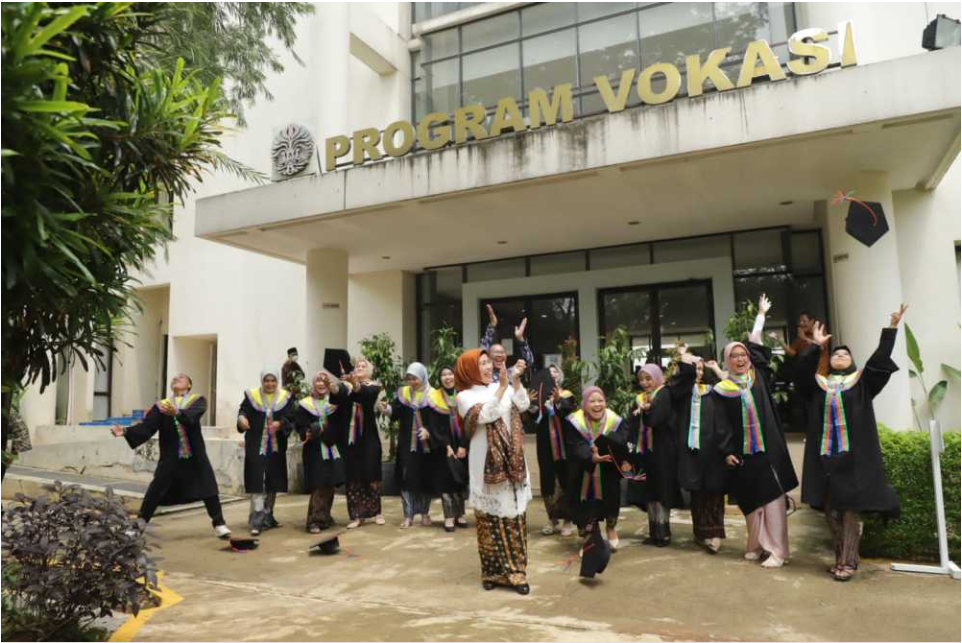
A total of 13 students who won the Serang Regency Government Vocational scholarship at the University of Indonesia graduated and immediately went to work at the Dr. Drajat Prawiranegara Hospital (RSDP).
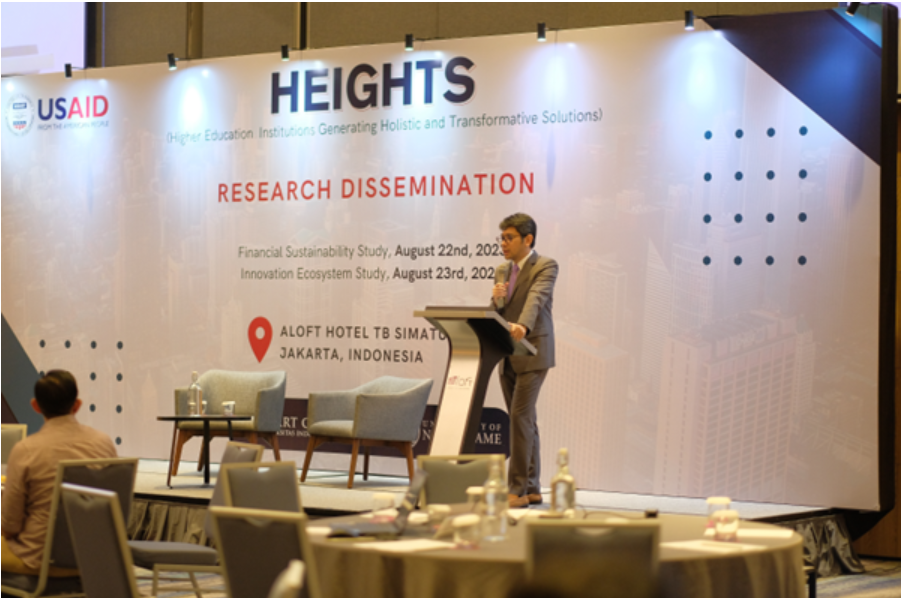
Smart City Universitas Indonesia (UI) collaborated with the University of Notre Dame and the United States Agency for International Development (USAID) to conduct research on the role of universities in creating a dynamic agricultural innovation ecosystem in West Java.
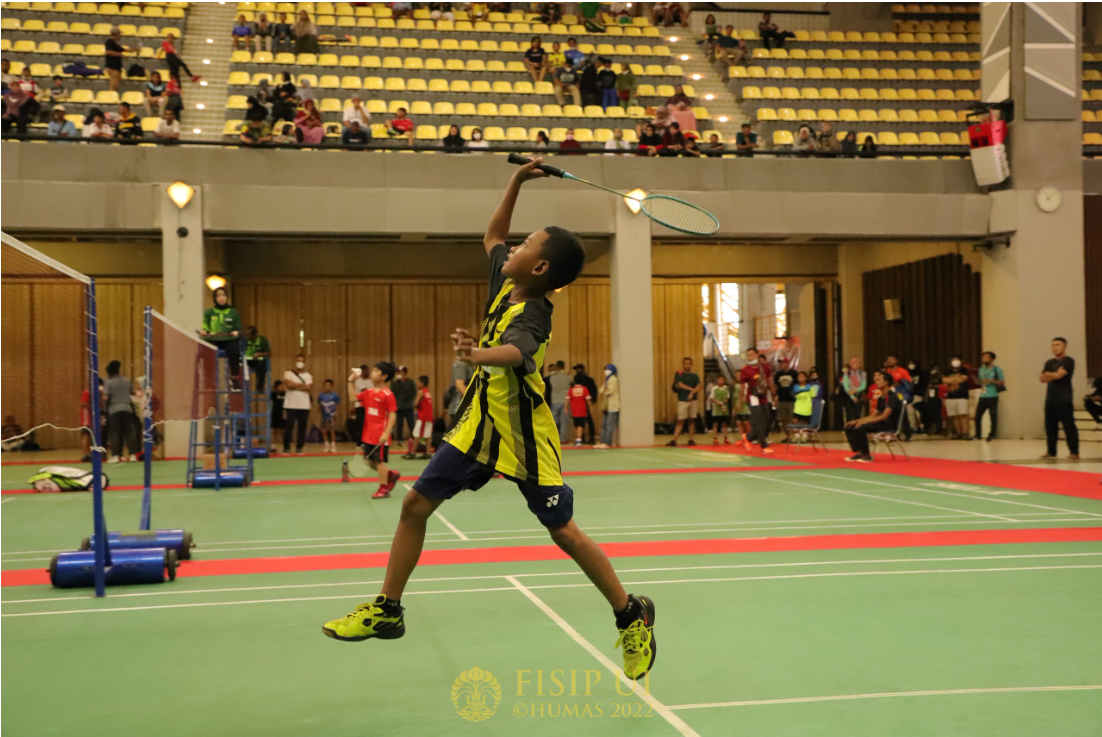
The Faculty of Social and Political Sciences UI, as an implementation of the Tri Darma of Higher Education, organizes integrated social programs through sports activities. It is a Badminton Championship event organized by FISIP which is attended by 511 badminton athletes.

